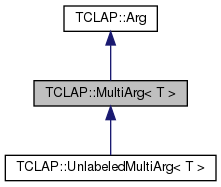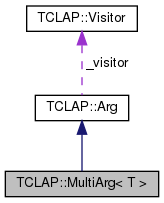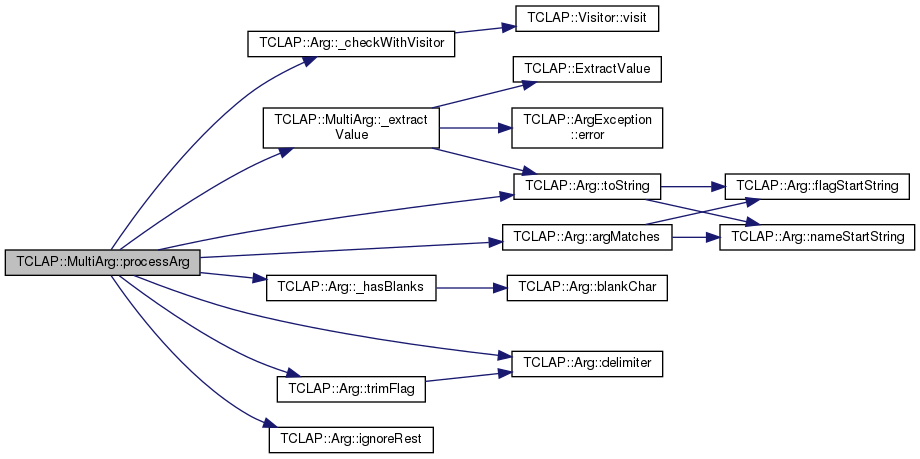An argument that allows multiple values of type T to be specified. More...
#include <MultiArg.h>


Public Types | |
| typedef std::vector< T > | container_type |
| typedef container_type::iterator | iterator |
| typedef container_type::const_iterator | const_iterator |
Public Member Functions | |
| MultiArg (const std::string &flag, const std::string &name, const std::string &desc, bool req, const std::string &typeDesc, Visitor *v=NULL) | |
| Constructor. More... | |
| MultiArg (const std::string &flag, const std::string &name, const std::string &desc, bool req, const std::string &typeDesc, CmdLineInterface &parser, Visitor *v=NULL) | |
| Constructor. More... | |
| MultiArg (const std::string &flag, const std::string &name, const std::string &desc, bool req, Constraint< T > *constraint, Visitor *v=NULL) | |
| Constructor. More... | |
| MultiArg (const std::string &flag, const std::string &name, const std::string &desc, bool req, Constraint< T > *constraint, CmdLineInterface &parser, Visitor *v=NULL) | |
| Constructor. More... | |
| virtual bool | processArg (int *i, std::vector< std::string > &args) |
| Handles the processing of the argument. More... | |
| const std::vector< T > & | getValue () const |
| Returns a vector of type T containing the values parsed from the command line. More... | |
| const_iterator | begin () const |
| Returns an iterator over the values parsed from the command line. More... | |
| const_iterator | end () const |
| Returns the end of the values parsed from the command line. More... | |
| virtual std::string | shortID (const std::string &val="val") const |
| Returns the a short id string. More... | |
| virtual std::string | longID (const std::string &val="val") const |
| Returns the a long id string. More... | |
| virtual bool | isRequired () const |
| Once we've matched the first value, then the arg is no longer required. More... | |
| virtual bool | allowMore () |
| Used for MultiArgs and XorHandler to determine whether args can still be set. More... | |
| virtual void | reset () |
| Clears the Arg object and allows it to be reused by new command lines. More... | |
 Public Member Functions inherited from TCLAP::Arg Public Member Functions inherited from TCLAP::Arg | |
| virtual | ~Arg () |
| Destructor. More... | |
| virtual void | addToList (std::list< Arg *> &argList) const |
| Adds this to the specified list of Args. More... | |
| virtual bool | operator== (const Arg &a) const |
| Operator ==. More... | |
| const std::string & | getFlag () const |
| Returns the argument flag. More... | |
| const std::string & | getName () const |
| Returns the argument name. More... | |
| std::string | getDescription () const |
| Returns the argument description. More... | |
| void | forceRequired () |
| Sets _required to true. More... | |
| void | xorSet () |
| Sets the _alreadySet value to true. More... | |
| bool | isValueRequired () const |
| Indicates whether a value must be specified for argument. More... | |
| bool | isSet () const |
| Indicates whether the argument has already been set. More... | |
| bool | isIgnoreable () const |
| Indicates whether the argument can be ignored, if desired. More... | |
| virtual bool | argMatches (const std::string &s) const |
| A method that tests whether a string matches this argument. More... | |
| virtual std::string | toString () const |
| Returns a simple string representation of the argument. More... | |
| virtual void | trimFlag (std::string &flag, std::string &value) const |
| Trims a value off of the flag. More... | |
| bool | _hasBlanks (const std::string &s) const |
| Checks whether a given string has blank chars, indicating that it is a combined SwitchArg. More... | |
| void | setRequireLabel (const std::string &s) |
| Sets the requireLabel. More... | |
| virtual bool | acceptsMultipleValues () |
| Use by output classes to determine whether an Arg accepts multiple values. More... | |
Protected Member Functions | |
| void | _extractValue (const std::string &val) |
| Extracts the value from the string. More... | |
 Protected Member Functions inherited from TCLAP::Arg Protected Member Functions inherited from TCLAP::Arg | |
| void | _checkWithVisitor () const |
| Performs the special handling described by the Visitor. More... | |
| Arg (const std::string &flag, const std::string &name, const std::string &desc, bool req, bool valreq, Visitor *v=NULL) | |
| Primary constructor. More... | |
Protected Attributes | |
| std::vector< T > | _values |
| The list of values parsed from the CmdLine. More... | |
| std::string | _typeDesc |
| The description of type T to be used in the usage. More... | |
| Constraint< T > * | _constraint |
| A list of constraint on this Arg. More... | |
| bool | _allowMore |
| Used by XorHandler to decide whether to keep parsing for this arg. More... | |
 Protected Attributes inherited from TCLAP::Arg Protected Attributes inherited from TCLAP::Arg | |
| std::string | _flag |
| The single char flag used to identify the argument. More... | |
| std::string | _name |
| A single word namd identifying the argument. More... | |
| std::string | _description |
| Description of the argument. More... | |
| bool | _required |
| Indicating whether the argument is required. More... | |
| std::string | _requireLabel |
| Label to be used in usage description. More... | |
| bool | _valueRequired |
| Indicates whether a value is required for the argument. More... | |
| bool | _alreadySet |
| Indicates whether the argument has been set. More... | |
| Visitor * | _visitor |
| A pointer to a visitor object. More... | |
| bool | _ignoreable |
| Whether this argument can be ignored, if desired. More... | |
| bool | _xorSet |
| Indicates that the arg was set as part of an XOR and not on the command line. More... | |
| bool | _acceptsMultipleValues |
Additional Inherited Members | |
 Static Public Member Functions inherited from TCLAP::Arg Static Public Member Functions inherited from TCLAP::Arg | |
| static void | beginIgnoring () |
| Begin ignoring arguments since the "--" argument was specified. More... | |
| static bool | ignoreRest () |
| Whether to ignore the rest. More... | |
| static char | delimiter () |
| The delimiter that separates an argument flag/name from the value. More... | |
| static char | blankChar () |
| The char used as a place holder when SwitchArgs are combined. More... | |
| static char | flagStartChar () |
| static const std::string | flagStartString () |
| static const std::string | nameStartString () |
| static const std::string | ignoreNameString () |
| The name used to identify the ignore rest argument. More... | |
| static void | setDelimiter (char c) |
| Sets the delimiter for all arguments. More... | |
Detailed Description
template<class T>
class TCLAP::MultiArg< T >
An argument that allows multiple values of type T to be specified.
Very similar to a ValueArg, except a vector of values will be returned instead of just one.
Definition at line 42 of file MultiArg.h.
Member Typedef Documentation
◆ const_iterator
| typedef container_type::const_iterator TCLAP::MultiArg< T >::const_iterator |
Definition at line 47 of file MultiArg.h.
◆ container_type
| typedef std::vector<T> TCLAP::MultiArg< T >::container_type |
Definition at line 45 of file MultiArg.h.
◆ iterator
| typedef container_type::iterator TCLAP::MultiArg< T >::iterator |
Definition at line 46 of file MultiArg.h.
Constructor & Destructor Documentation
◆ MultiArg() [1/4]
| TCLAP::MultiArg< T >::MultiArg | ( | const std::string & | flag, |
| const std::string & | name, | ||
| const std::string & | desc, | ||
| bool | req, | ||
| const std::string & | typeDesc, | ||
| Visitor * | v = NULL |
||
| ) |
Constructor.
- Parameters
-
flag - The one character flag that identifies this argument on the command line. name - A one word name for the argument. Can be used as a long flag on the command line. desc - A description of what the argument is for or does. req - Whether the argument is required on the command line. typeDesc - A short, human readable description of the type that this object expects. This is used in the generation of the USAGE statement. The goal is to be helpful to the end user of the program. v - An optional visitor. You probably should not use this unless you have a very good reason.
Definition at line 237 of file MultiArg.h.
References TCLAP::Arg::_acceptsMultipleValues.
◆ MultiArg() [2/4]
| TCLAP::MultiArg< T >::MultiArg | ( | const std::string & | flag, |
| const std::string & | name, | ||
| const std::string & | desc, | ||
| bool | req, | ||
| const std::string & | typeDesc, | ||
| CmdLineInterface & | parser, | ||
| Visitor * | v = NULL |
||
| ) |
Constructor.
- Parameters
-
flag - The one character flag that identifies this argument on the command line. name - A one word name for the argument. Can be used as a long flag on the command line. desc - A description of what the argument is for or does. req - Whether the argument is required on the command line. typeDesc - A short, human readable description of the type that this object expects. This is used in the generation of the USAGE statement. The goal is to be helpful to the end user of the program. parser - A CmdLine parser object to add this Arg to v - An optional visitor. You probably should not use this unless you have a very good reason.
Definition at line 253 of file MultiArg.h.
References TCLAP::Arg::_acceptsMultipleValues, and TCLAP::CmdLineInterface::add().

◆ MultiArg() [3/4]
| TCLAP::MultiArg< T >::MultiArg | ( | const std::string & | flag, |
| const std::string & | name, | ||
| const std::string & | desc, | ||
| bool | req, | ||
| Constraint< T > * | constraint, | ||
| Visitor * | v = NULL |
||
| ) |
Constructor.
- Parameters
-
flag - The one character flag that identifies this argument on the command line. name - A one word name for the argument. Can be used as a long flag on the command line. desc - A description of what the argument is for or does. req - Whether the argument is required on the command line. constraint - A pointer to a Constraint object used to constrain this Arg. v - An optional visitor. You probably should not use this unless you have a very good reason.
Definition at line 274 of file MultiArg.h.
References TCLAP::Arg::_acceptsMultipleValues.
◆ MultiArg() [4/4]
| TCLAP::MultiArg< T >::MultiArg | ( | const std::string & | flag, |
| const std::string & | name, | ||
| const std::string & | desc, | ||
| bool | req, | ||
| Constraint< T > * | constraint, | ||
| CmdLineInterface & | parser, | ||
| Visitor * | v = NULL |
||
| ) |
Constructor.
- Parameters
-
flag - The one character flag that identifies this argument on the command line. name - A one word name for the argument. Can be used as a long flag on the command line. desc - A description of what the argument is for or does. req - Whether the argument is required on the command line. constraint - A pointer to a Constraint object used to constrain this Arg. parser - A CmdLine parser object to add this Arg to v - An optional visitor. You probably should not use this unless you have a very good reason.
Definition at line 290 of file MultiArg.h.
References TCLAP::Arg::_acceptsMultipleValues, and TCLAP::CmdLineInterface::add().

Member Function Documentation
◆ _extractValue()
|
protected |
Extracts the value from the string.
Attempts to parse string as type T, if this fails an exception is thrown.
- Parameters
-
val - The string to be read.
Definition at line 398 of file MultiArg.h.
References TCLAP::MultiArg< T >::_constraint, TCLAP::MultiArg< T >::_values, TCLAP::ArgException::error(), TCLAP::ExtractValue(), and TCLAP::Arg::toString().
Referenced by TCLAP::UnlabeledMultiArg< T >::processArg(), and TCLAP::MultiArg< T >::processArg().

◆ allowMore()
|
virtual |
Used for MultiArgs and XorHandler to determine whether args can still be set.
Reimplemented from TCLAP::Arg.
Definition at line 417 of file MultiArg.h.
References TCLAP::MultiArg< T >::_allowMore.
Referenced by TCLAP::MultiArg< T >::end().
◆ begin()
|
inline |
Returns an iterator over the values parsed from the command line.
Definition at line 197 of file MultiArg.h.
◆ end()
|
inline |
Returns the end of the values parsed from the command line.
Definition at line 203 of file MultiArg.h.
References TCLAP::MultiArg< T >::allowMore(), TCLAP::MultiArg< T >::isRequired(), TCLAP::MultiArg< T >::longID(), TCLAP::MultiArg< T >::reset(), and TCLAP::MultiArg< T >::shortID().

◆ getValue()
|
inline |
Returns a vector of type T containing the values parsed from the command line.
Definition at line 191 of file MultiArg.h.
References TCLAP::MultiArg< T >::_values.
◆ isRequired()
|
virtual |
Once we've matched the first value, then the arg is no longer required.
Reimplemented from TCLAP::Arg.
Definition at line 383 of file MultiArg.h.
References TCLAP::Arg::_required, and TCLAP::MultiArg< T >::_values.
Referenced by TCLAP::MultiArg< T >::end().
◆ longID()
|
virtual |
Returns the a long id string.
Used in the usage.
- Parameters
-
val - value to be used.
Reimplemented from TCLAP::Arg.
Reimplemented in TCLAP::UnlabeledMultiArg< T >.
Definition at line 372 of file MultiArg.h.
References TCLAP::MultiArg< T >::_typeDesc, and TCLAP::Arg::longID().
Referenced by TCLAP::MultiArg< T >::end().

◆ processArg()
|
virtual |
Handles the processing of the argument.
This re-implements the Arg version of this method to set the _value of the argument appropriately. It knows the difference between labeled and unlabeled.
- Parameters
-
i - Pointer the the current argument in the list. args - Mutable list of strings. Passed from main().
Implements TCLAP::Arg.
Reimplemented in TCLAP::UnlabeledMultiArg< T >.
Definition at line 308 of file MultiArg.h.
References TCLAP::Arg::_alreadySet, TCLAP::Arg::_checkWithVisitor(), TCLAP::MultiArg< T >::_extractValue(), TCLAP::Arg::_hasBlanks(), TCLAP::Arg::_ignoreable, TCLAP::Arg::argMatches(), TCLAP::Arg::delimiter(), TCLAP::Arg::ignoreRest(), TCLAP::Arg::toString(), and TCLAP::Arg::trimFlag().

◆ reset()
|
virtual |
Clears the Arg object and allows it to be reused by new command lines.
Reimplemented from TCLAP::Arg.
Definition at line 425 of file MultiArg.h.
References TCLAP::MultiArg< T >::_values, and TCLAP::Arg::reset().
Referenced by TCLAP::MultiArg< T >::end().

◆ shortID()
|
virtual |
Returns the a short id string.
Used in the usage.
- Parameters
-
val - value to be used.
Reimplemented from TCLAP::Arg.
Reimplemented in TCLAP::UnlabeledMultiArg< T >.
Definition at line 362 of file MultiArg.h.
References TCLAP::MultiArg< T >::_typeDesc, and TCLAP::Arg::shortID().
Referenced by TCLAP::MultiArg< T >::end().

Member Data Documentation
◆ _allowMore
|
protected |
Used by XorHandler to decide whether to keep parsing for this arg.
Definition at line 77 of file MultiArg.h.
Referenced by TCLAP::MultiArg< T >::allowMore().
◆ _constraint
|
protected |
A list of constraint on this Arg.
Definition at line 64 of file MultiArg.h.
Referenced by TCLAP::MultiArg< T >::_extractValue().
◆ _typeDesc
|
protected |
The description of type T to be used in the usage.
Definition at line 59 of file MultiArg.h.
Referenced by TCLAP::UnlabeledMultiArg< T >::longID(), TCLAP::MultiArg< T >::longID(), TCLAP::UnlabeledMultiArg< T >::shortID(), and TCLAP::MultiArg< T >::shortID().
◆ _values
|
protected |
The list of values parsed from the CmdLine.
Definition at line 54 of file MultiArg.h.
Referenced by TCLAP::MultiArg< T >::_extractValue(), TCLAP::MultiArg< T >::getValue(), TCLAP::MultiArg< T >::isRequired(), and TCLAP::MultiArg< T >::reset().
The documentation for this class was generated from the following file:
 1.8.13
1.8.13